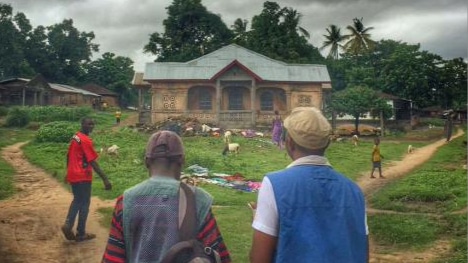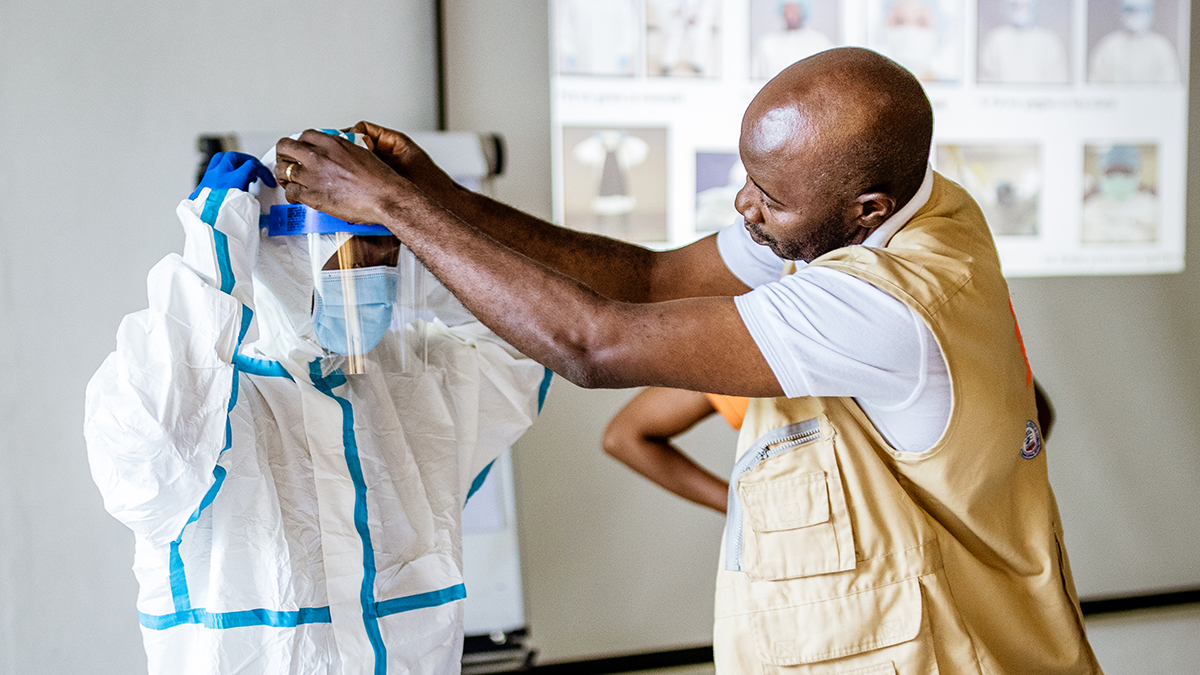At a glance
CDC began working in Sierra Leone in the 1970’s and established an office in 2015. CDC works closely with Sierra Leone’s Ministry of Health (MOH), National Public Health Agency (NPHA), and funded partner organizations to build effective public health collaboration and partnerships to detect, prevent, and respond to global public health threats. CDC’s work aims to protect the health of Americans and support public health around the world.

Key accomplishments

- Supported establishment of electronic case-based disease surveillance information system used by over 1,300 health facilities. More than 90% of health facilities report data on priority diseases in a timely manner.
- Increased ability to detect and diagnose 10 key diseases, including COVID-19, Ebola, yellow fever, cholera, and influenza.
- Supported training of over 400 public health professionals who graduated through the Field Epidemiology Training Program (FETP), which resulted in at least 1 FETP-trained epidemiologist per 200,000 people.
- Assisted the MOH in developing a multisectoral surge personnel deployment plan and roster, which has over 3,800 multidisciplinary surge personnel throughout the country.
- Provided support and technical advice to increase the number of people vaccinated for COVID-19 and HPV by countering vaccine misinformation.
Global health security
CDC’s global health security (GHS) work in Sierra Leone increases the country’s ability to detect, notify, and respond to disease outbreaks before they become global epidemics. CDC focuses on strengthening the country’s public health systems across surveillance, laboratory, workforce development, and emergency response. CDC provides expertise and support to MOH, NPHA, and other government institutions to strengthen GHS in Sierra Leone. Sierra Leone launched NPHA in December 2023, enabled by CDC’s technical and financial support. NPHA serves as a central coordinating structure for public health functions.
Disease surveillance
CDC supported Sierra Leone’s development and implementation of a national electronic Integrated Disease Surveillance and Response system. This includes a reporting system for priority diseases. CDC also supported the establishment of an electronic case-based disease surveillance information system (eCBDS) that reports case-level data. The eCBDS tracks epidemic-prone disease outbreaks and covers both COVID-19 and all epidemic-prone priority disease reporting. The electronic reporting system and eCBDS are key assets to Sierra Leone’s COVID-19 response. All districts now have established disease reporting structures for timely communication of potential disease outbreaks.
Laboratory systems strengthening
CDC has supported laboratory strengthening in Sierra Leone by training laboratory technicians and investing in the Central Public Health Reference Laboratory. CDC investments in Sierra Leone’s laboratory network helped expand:
- Microbiology and molecular diagnostic methods
- Specimen collection and transport
- Biosafety standard operating procedures
- Linkage of laboratory results with surveillance case data
Workforce development
CDC helped Sierra Leone establish FETP in 2016. FETP trains health professionals in collecting, analyzing, and interpreting data to inform evidence-based decisions. Three levels of training—advanced, intermediate, and frontline—enhance national and local surveillance capabilities to investigate outbreaks before they become epidemics. CDC helped transition FETP Frontline to operate under the guidance of MOH. FETP graduates throughout.
Sierra Leone conduct critical surveillance activities and outbreak investigations for infectious diseases. Diseases have included COVID-19 and viral hemorrhagic fevers such as Ebola and Lassa fever.
Emergency response
CDC fosters both national and district emergency management capacities, including conducting risk assessments for all districts and supporting training programs in Public Health Emergency Management. CDC’s technical assistance included the development of public health emergency response plans for COVID-19 at points of entry and Ebola simulation exercises to identify gaps and prepare for cross-border cases. CDC assisted the MOH in developing a multisectoral surge personnel deployment plan and roster, which has over 3,800 multidisciplinary surge personnel throughout the country. CDC also supports public health emergency operations centers.
HIV and TB
As a key implementer of the U.S. President's Emergency Plan for AIDS Relief (PEPFAR), CDC plays an essential role in the fight against HIV and TB. With unmatched scientific and technical knowledge and long-standing relationships with ministries of health, CDC is uniquely positioned to advance HIV, TB, and other global health security activities that keep Americans safe at home and abroad.
Through PEPFAR, CDC provides critical support to Sierra Leone's public health infrastructure, improving the country's ability to prevent, detect, and respond to HIV, TB, and other infectious diseases and minimizing their risk from entering the U.S.
Infection prevention and control (IPC)
CDC first trained healthcare workers in infection prevention and control (IPC) during the 2014-2016 Ebola epidemic. CDC continued supporting these trainings during the COVID-19 pandemic. IPC trainings help healthcare workers expand their knowledge, skills and competencies in providing quality healthcare services to patients admitted to COVID-19 centers. CDC also helped MOH establish IPC certification courses. Course graduates continue to support the COVID-19 response within their communities, local health facilities, institutions, and district health management teams. IPC is key to prevention and control of antimicrobial resistance. CDC supports implementation of surgical site infection surveillance in 16 health facilities. This work aims to increase the quality of surgical site infection (SSI) surveillance and prevent SSI and other healthcare-associated infections.

![[thumbnail] (hidden)](/global-health/media/images/2025/12/Sierra_Leone_thumbnail.jpg)
